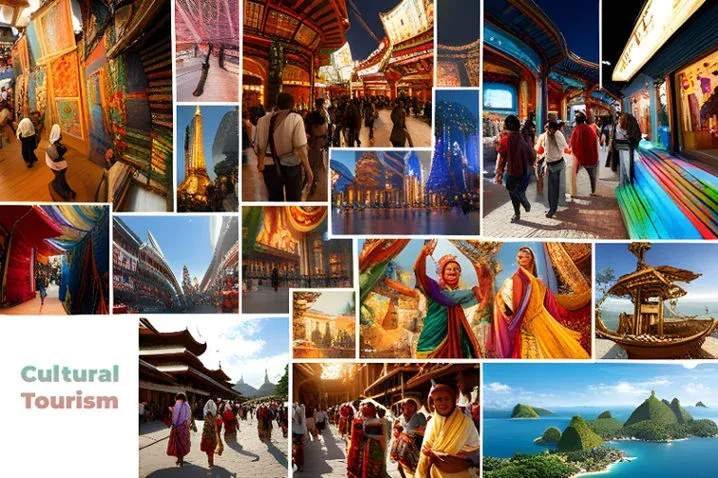Why Cultural Tourism is the Key to Meaningful Travel

Why Cultural Tourism is the Key to Meaningful Travel
As global travel rebounds and destinations seek deeper, more sustainable ways to engage visitors, cultural tourism is emerging as the central pathway to meaningful travel. Far from simple sightseeing, cultural tourism weaves together history, arts, local livelihoods, and intangible traditions. This news-style report explores why cultural tourism now headlines travel strategy discussions, highlights recent developments in community-led approaches, and offers practical guidance for travelers who want trips that enrich both visitor and host communities.

What is cultural tourism and why it matters now
Cultural tourism places human stories and creative expressions at the center of travel experiences. It includes visits to museums and heritage sites, but it also embraces festivals, community homestays, craft workshops, culinary trails, and oral histories. Recent travel reports show a shift from volume-driven tourism to experience-driven travel, with many destinations prioritizing cultural programming to distribute benefits more equitably and reduce pressure on fragile natural sites.
Latest development: community-led models and policy shifts
Governments and NGOs are increasingly funding community heritage projects, enabling villagers and urban neighborhoods to curate tourism offerings themselves. This decentralization is a major development: it shifts revenue toward local stewards, nurtures traditional skills, and reduces overtourism in marquee sites. Policy makers are also integrating cultural tourism into urban renewal and rural development strategies, treating festivals, living crafts, and storytelling as economic assets rather than just attractions.
Case study: small grants, big impact
In several regions, microgrant programs have enabled artisans to upgrade workspaces, form cooperative stall clusters, and offer short, hands-on workshops for visitors. These modest investments yield outsized returns: extended visitor stays, greater per-visitor spending, and stronger public support for heritage conservation. For travelers, these programs translate into richer, more authentic interactions and souvenirs that carry provenance and purpose.
Also Read: Best Heritage Walks in Famous Cities
How cultural tourism benefits communities and visitors
When designed respectfully, cultural tourism generates local income, preserves languages and crafts, and incentivizes younger generations to maintain traditional knowledge. For visitors, cultural tourism transforms passive observation into participatory learning: cooking a regional dish, listening to elders recount neighborhood histories, or assisting in a craft session creates lasting memories and a deeper appreciation for place. These exchanges also foster empathy and cross-cultural understanding, which many travelers now seek as part of meaningful travel.
Economic resilience through diversified tourism
Diversifying tourism products to include cultural components helps destinations weather shocks. Rather than relying solely on a single attraction or season, communities can offer year-round workshops, festivals timed to agricultural cycles, and indoor experiences that cushion against weather-related downturns. For stakeholders, this strategic shift is increasingly visible in destination management plans and tourism recovery frameworks.
Responsible practices travelers should follow
Meaningful cultural travel requires humility and preparation. Research community norms before arrival, dress appropriately at sacred sites, ask permission before photographing people, and prioritize paid experiences run by locals. Avoid one-off interactions that commodify rituals; instead, select programs that give context, compensate participants fairly, and demonstrate a commitment to cultural continuity.
Red flags and ethical choices
Be wary of experiences that stage or misrepresent traditions purely for tourists, pay minimal fees to performers, or disrespect community governance. Ask hosts how proceeds are distributed, prefer cooperative-run shops over single middlemen, and support initiatives that reinvest in cultural transmission and education.
How to choose authentic cultural experiences
Look for experiences that prioritize storytelling, offer small-group formats, and provide tangible outcomes for hosts: skills transfer, fair wages, or community projects. Reviews and local tourism boards can flag well-run programs; however, the best indicator is transparency about fees, provenance of crafts, and the presence of local leadership in program design.
Practical tips for travelers
Before you go: read about local customs, learn a few phrases in the local language, and identify community-run experiences to book. During your visit: listen more than you speak, buy fewer but higher-quality local goods, and participate in workshops that teach rather than commodify. After your trip: share honest feedback that highlights fair practice and consider donating to heritage preservation funds if you want to contribute beyond spending.
The future: integrating cultural tourism into sustainable development
As destinations refine recovery strategies, cultural tourism will play a central role in achieving sustainable development goals: preserving heritage, creating livelihoods, and fostering social cohesion. The most successful programs will be those co-designed with communities, backed by transparent funding, and measured not only in visitor numbers but in cultural vitality. For travelers seeking meaning, cultural tourism is not a trend — it is the new baseline for travel that respects people, place, and continuity.
This report urges travelers to choose curiosity over consumption, to support projects that sustain culture rather than extract from it, and to view travel as a two-way exchange of value. Cultural tourism offers the rare opportunity to leave places better than we found them — and to return home transformed by the stories we carry.
Comment / Reply From
No comments yet. Be the first to comment!







